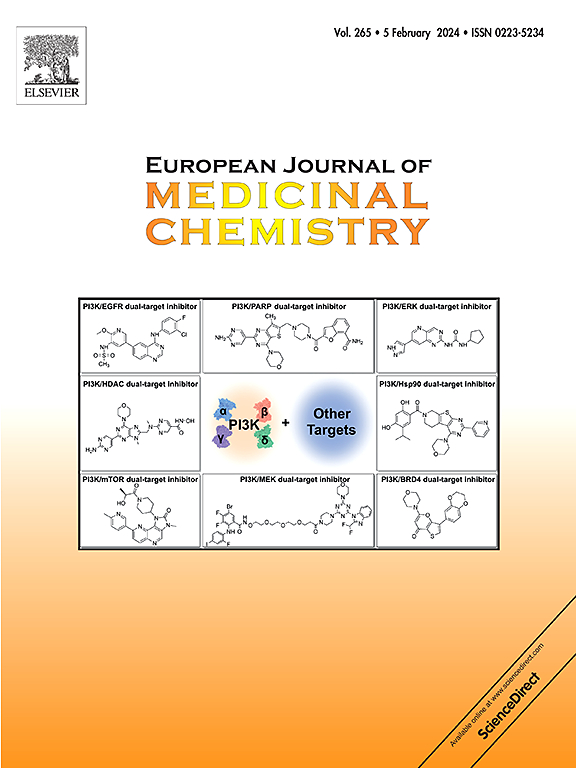肿瘤KRAS抑制剂的合成方法及临床应用
IF 6
2区 医学
Q1 CHEMISTRY, MEDICINAL
引用次数: 0
摘要
Kirsten大鼠肉瘤病毒癌基因同系物(KRAS)突变是各种癌症中最常见的致癌改变之一,包括胰腺癌、结直肠癌和非小细胞肺癌(NSCLC)。由于KRAS对三磷酸鸟苷(GTP)具有高亲和力,且缺乏可药物结合位点,因此靶向KRAS一直被认为是一项艰巨的挑战。然而,最近小分子抑制剂设计的进步导致了针对KRAS突变的靶向治疗的发展,特别是KRASG12C突变。Sotorasib和Adagrasib等抑制剂通过不可逆地结合突变KRAS蛋白,将其锁定在非活性状态并破坏对肿瘤生长和存活至关重要的下游信号通路,在临床前和临床研究中显示出前景。这些抑制剂在治疗krasg12c突变的癌症患者中已显示出临床疗效,可导致肿瘤消退,延长无进展生存期,改善患者预后。这篇综述讨论了用于开发这些KRAS抑制剂的合成策略,并研究了这些抑制剂的临床应用,重点介绍了在临床试验中遇到的挑战和成功。最终,KRAS抑制剂代表了癌症治疗的一个突破,为KRAS驱动的肿瘤患者提供了一个有希望的新治疗选择。本文章由计算机程序翻译,如有差异,请以英文原文为准。


Synthetic approaches and clinical application of KRAS inhibitors for cancer therapy
Kirsten rat sarcoma viral oncogene homolog (KRAS) mutations are among the most common oncogenic alterations in various cancers, including pancreatic, colorectal, and non-small cell lung cancer (NSCLC). Targeting KRAS has long been considered a difficult challenge due to its high affinity for guanosine triphosphate (GTP) and the lack of a druggable binding site. However, recent advancements in small-molecule inhibitor design have led to the development of targeted therapies aimed at KRAS mutations, particularly the KRASG12C mutation. Inhibitors such as Sotorasib and Adagrasib have shown promise in preclinical and clinical studies by irreversibly binding to the mutant KRAS protein, locking it in an inactive state and disrupting downstream signaling pathways critical for tumor growth and survival. These inhibitors have demonstrated clinical efficacy in treating patients with KRASG12C-mutated cancers, leading to tumor regression, prolonged progression-free survival, and improved patient outcomes. This review discusses the synthetic strategies employed to develop these KRAS inhibitor and also examines the clinical application of these inhibitors, highlighting the challenges and successes encountered during clinical trials. Ultimately, KRAS inhibitors represent a breakthrough in cancer therapy, offering a promising new treatment option for patients with KRAS-driven tumors.
求助全文
通过发布文献求助,成功后即可免费获取论文全文。
去求助
来源期刊
CiteScore
11.70
自引率
9.00%
发文量
863
审稿时长
29 days
期刊介绍:
The European Journal of Medicinal Chemistry is a global journal that publishes studies on all aspects of medicinal chemistry. It provides a medium for publication of original papers and also welcomes critical review papers.
A typical paper would report on the organic synthesis, characterization and pharmacological evaluation of compounds. Other topics of interest are drug design, QSAR, molecular modeling, drug-receptor interactions, molecular aspects of drug metabolism, prodrug synthesis and drug targeting. The journal expects manuscripts to present the rational for a study, provide insight into the design of compounds or understanding of mechanism, or clarify the targets.

 求助内容:
求助内容: 应助结果提醒方式:
应助结果提醒方式:


